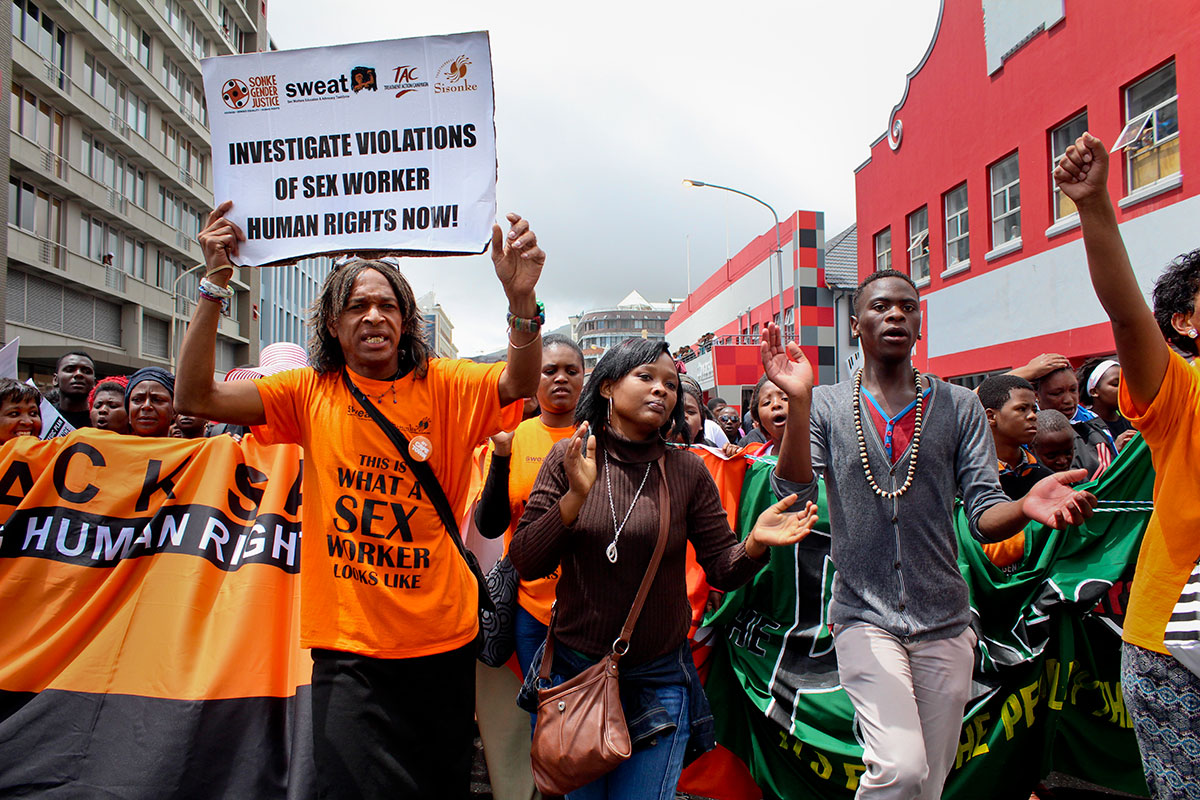“Kubi Kubi siyafa yi GBV, noba besidlwengula siyaya epalamente”
(It’s really bad, we are dying from GBV, and even if we are raped we are still going to Parliament)
It is one of those strange November days in Cape Town – it is muggy and sticky, and rain clouds dangle hesitantly over the City Bowl. I stand among a crowd of protesters gathering on the far side of the Parade. There is excitement and anger in the 2500 strong crowd, which ripple out to Gauteng and the Eastern Cape where likeminded people also gathered in similar protest action two days prior. My colleague from Sonke Gender Justice, Vuyiseka Dubula, is bravely balanced at the back of a truck with a microphone, urging protesters to stay inside the lines carried by march marshals and behind the banners of the more than 35 civil society organisations supporting this direct action. We are on our way to Parliament to demand that the South African government draft, cost and implement a robust plan on dealing with Gender Based Violence (GBV). That the Minister of Women, Susan Shabangu, does her job properly, and not dither about. March slogans and songs echo off nearby buildings and warn parliament of our imminent arrival.
Ours is not a particularly big or controversial ask. Government has sustained a National Strategy Plan for HIV/AIDS for years, and GBV demands similar attention and political will. Indeed, if government is not swayed by the thousands of women, men and children who are battered, raped, stabbed, killed and strangled every year, then the R30-40 billion annual economic loss due to GBV, should galvanise them into firm action. It should.
I gather with other sex work activists near the Sisonke Sex Worker Movement banner. A brave group of sex workers and sex worker advocates are supporting the march today, demanding a national plan to address GBV, and that the decriminalisation of sex work is explicitly included in the Plan. The group that feels the worst impact of the violence that is slowly consuming our South African soul is sex workers. The combination of a criminalised profession, social scorn, little or no protection from the law, and daily interaction with potentially dangerous clients and brutal police, means that sex workers know the meaning of marginality and vulnerability intimately. And that of injustice and violence. Female sex workers, says research, are 18 times more likely to be murdered than other women.
I find myself standing next to Angela – a sex worker activist and peer educator I have known for a couple of years. She works as an outreach peer educator with the Sex Workers Education & Advocacy Taskforce (SWEAT) and also as a part-time sex worker. She provides for four children and grandchildren. We greet and start chatting. When Angela moves her head and the faltering sun illuminates her face, I see a deep purple bruise billowing up from underneath her left eye. I stare in shock. I asked her what had happened, and she explains how she was attacked the week before.
Her job entails education and outreach to sex workers, and for peer educators, normal office hours do not hold. The previous Thursday she had ended her shift in Greenpoint at 10:30pm, and took a combi taxi to Khayelitsha. She didn’t have the additional R30 for the taxi to drop her at home, and had to make do with the taxi stop that was a 30 minute fast walk from her house. Four “skollies” followed her when she disembarked. She started running and fell. They kicked her and hit her face with a rock. They made off with her bag with her “ID and medication” – her cellphone was cleverly hidden in her pantyhose. People from a nearby shebeen escorted her home after the attack. She tells me she’s using skin oil to sooth the throbbing skin around her eye, and how it is working well.
Now the bruise on her arm makes sense – I glanced over it when we greeted. I feel mortified. I am so accustomed to working alongside sex workers with obvious, terrible scars bearing testament on their bodies – burnt arms and legs, zig-zag stab marks on cheek bones, disfigured shoulder blades and calves, and one colleague in Hillbrow with a noticeable limp (after having been thrown from a moving police car) – that sometimes I do not even notice signs of physical harm when it is right in front of my own un-bruised eyes. It seems to have become everyday and mundane.
What exactly does that say about me? What does it say about South African society when brutality becomes normalised in this wicked way?
I ask Angela if I can take a photo of her. She waves her placard and raises her fist defiantly in the air. A shy smile flutters over her mouth and the bruise melts around the friendly laughter wrinkles. But does not disappear.
I give her a hug, and gulp down the grief that becomes tangible bile in my mouth. The truck and marchers start moving. I take my cue from Angela and am galvanised into action. With an acid tongue and a heavy but defiant heart, I shout and march with resolution to Parliament.
And not even the suddenly decisive rainstorm can deter us.








